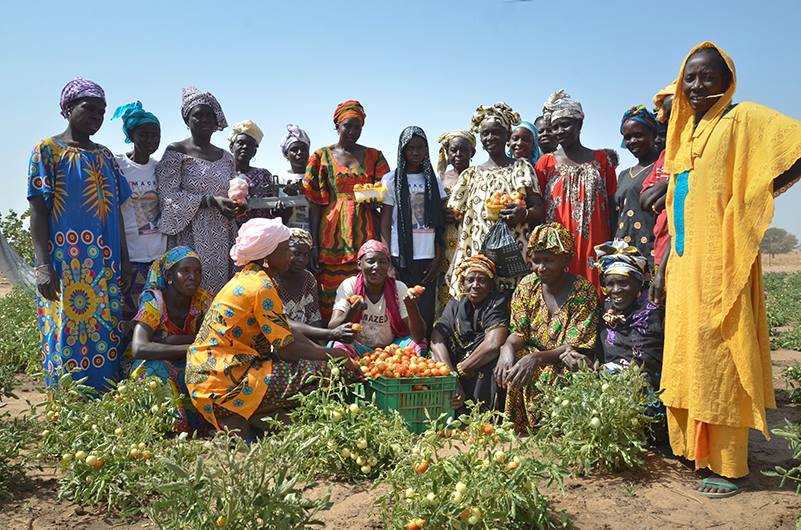Climate change is a global challenge that affects communities around the world. Many people are working to develop sustainable lifestyles locally in an effort to alleviate this challenge. How can local environmental changes have global effects? Part of the solution to climate change is realizing the world is an ecosystem and that we are all connected. What happens in my country affects what happens in your country, and what happens in your country affects what happens in mine. Much of the world’s contribution to climate change has come from more developed countries, and yet it is the less industrial countries that are paying a large price.
Through implementing environmental solutions, developing countries can sustainably overcome the challenges that climate change has caused. This creates a ripple effect of “greener” economies introduced around the world. CREATE! works to develop climate change solutions in rural Senegal. Interested in being a part of the movement? CREATE! has developed a Carbon Footprint Calculator where you can offset your annual transportation carbon footprint by donating to our sustainability programs.
Why Did We Choose to Calculate Carbon Footprints from Transportation?
We believe that all sources of carbon emissions regarding climate change should be addressed. However, for CREATE!’s Transportation Carbon Footprint Calculator, we are focusing on carbon emissions from transportation. Along with food and housing, transportation is one of the larger and more widely spread contributors to climate change. According to the New York Times, transportation accounted for one-fifth of the U.S. carbon footprint in 2017. Daily commutes, annual vacations, and more have added up across the country to a total of 1,098 million metric tons of carbon dioxide equivalents (Root). We want to address this issue because of its prevalence in people’s daily lives around the world.
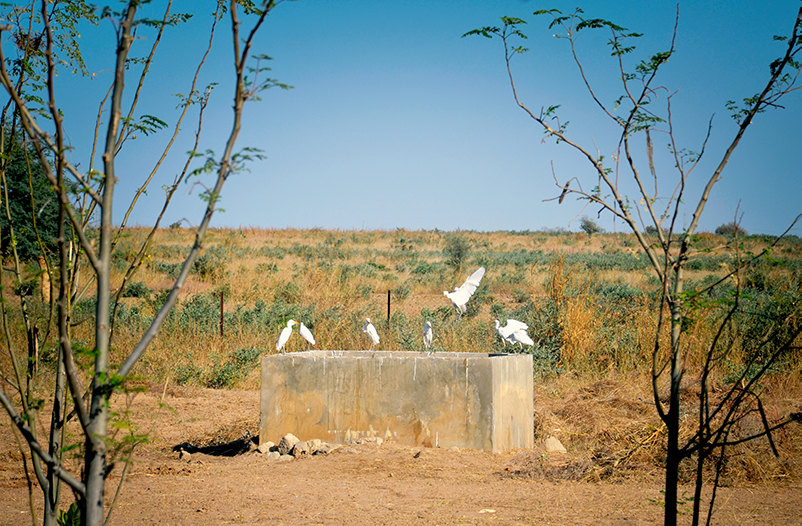
White cranes land on the water basin on the outskirts of Back Samba Dior.
The Effects of Climate Change in Rural Senegal
Climate change has devastated much of the world. In Senegal, climate change and deforestation are contributing to the rapid encroachment of the desert in rural areas. This causes the soil to degrade, agriculture to be less productive, temperatures to rise, and critical natural resources to decline. These challenges have led to human migration, loss of resources, reduced quality of life, and loss of economic opportunity. According to the World Bank, about 60% of Senegal’s population lives in rural areas and about 30% lives on less than $1.25 per day. This means that over half the country’s population is drastically affected by climate change. With limited access to electricity and water, the rural poor are more reliant on (and vulnerable to) their environment and climate than those who live in the cities with easy access to resources and amenities.
How do we address it?
CREATE! is working to alleviate this challenge by utilizing renewable and appropriate technologies to gain access to water and develop food security as well as income-generating activities. We believe that meeting basic human needs and responding to the effects of climate change go hand-in-hand. By implementing climate change alleviation projects in rural Senegal, we aim to help communities gain access to clean water, energy, food, and income. CREATE! uses local and renewable technologies and strategies that combat the effects of climate change and empower families to improve their livelihoods for generations to come.
CREATE!’s Solar water project
“We encounter very few limitations now because there is bountiful water in the village. With water, we can do anything.” – Ngoné Mar, Fass Kane
The solar water project is our keystone program. Water is the foundation for economic success in rural Senegal. CREATE!‘s solar water projects bring year-round water to communities. With year-round access to water, communities can engage in projects such as tree-planting campaigns and community gardening through which families develop food security and income-generating opportunities.
In rural Senegal, the sun is an abundant and vital source of energy, whereas water is a scarce and critical resource that is difficult to get out of the ground. Through the use of solar power, CREATE! aims to make water as plentiful as sunshine in our partner communities. CREATE! technicians install solar-powered pumping systems in rehabilitated wells in these communities to address this issue. These pumps bring water from communities’ wells, and into their 5,000-liter water reservoirs. This provides an easily accessed and abundant source of freshwater. Now, year-round crop cultivation possible for the first time without the use of expensive and nonrenewable fossil fuels! Learn more here.
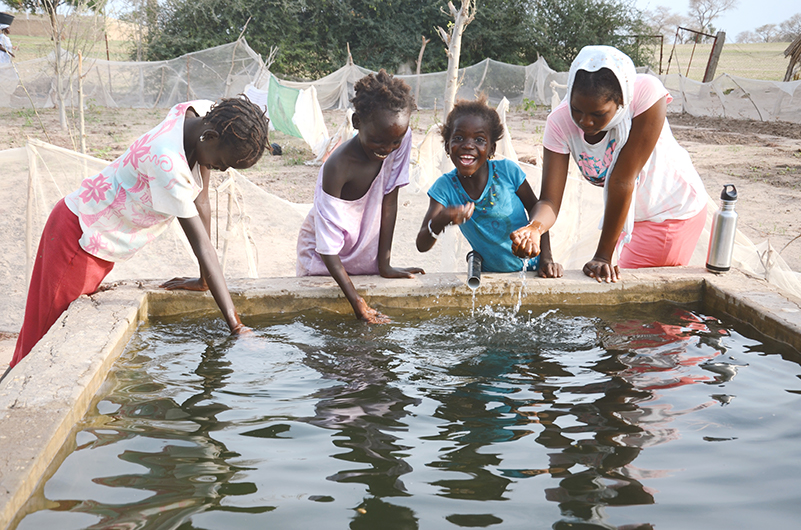
Young girls stop at the water basin in Thienaba.
CREATE!’s Tree-planting program
“Trees are our life-givers. It is our duty to plant trees for the future of our children.” – Ndeye Diop, Walo
CREATE!‘s tree-planting program helps reforest and replenish regions that have been stripped of nutrients due to land exploitation and increasing desertification. Not only do trees support the health of the soil, but they also improve food security for families in rural Senegal.
CREATE!’s partners communities plant an average of 2,000 trees each per year. Volunteers carefully raise these seedlings in the nurseries throughout the year. Next, during rainy season, they plant them in their cooperative gardens, as well as throughout their villages and home compounds. Over the years, the trees mature, and many produce nuts and fruit that will be harvested for food and firewood that people use in their improved cookstoves. Additionally, temperatures can be reduced by up to 10 degrees F under their shade, helping soil to retain more moisture, and providing some relief from the hot desert sun. Learn more here.
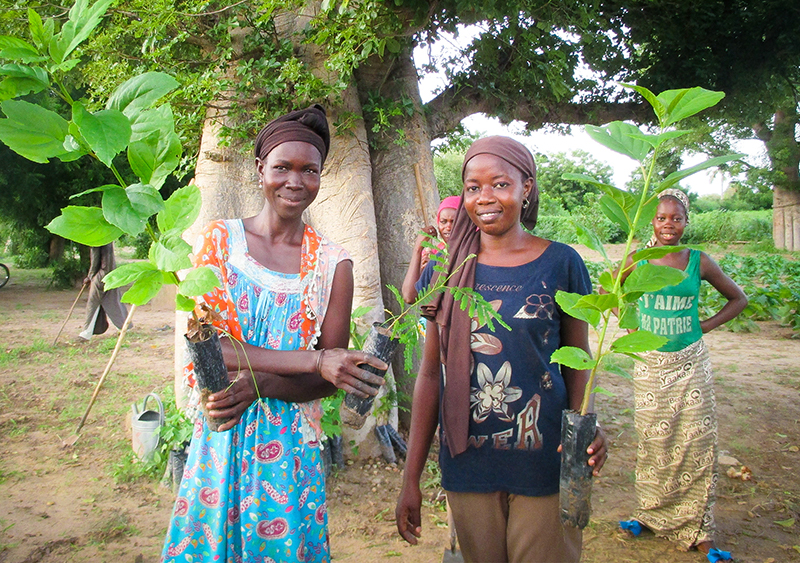
Field technician, Codou, and community volunteer, Arame, participate in CREATE!’s tree-planting campaign.
Offset Your Transportation Carbon Footprint: How can local environmental changes have global effects?
Through CREATE!‘s Carbon Footprint Calculator, you can calculate your annual transportation carbon footprint and offset it by donating to one of CREATE!’s climate action projects in rural Senegal. If we are to achieve global stability, we must understand that our world is an ecosystem. Our choices, whether sustainable or not, effect environments around the world. Climate change is a global problem, and we need to come together as a global community to work together to solve it. To calculate and offset your annual transportation carbon footprint, click here.
Let’s Support a Greener Future for All
Want to learn about more ways you can reduce your transportation carbon emission? Check out these “green” ideas here. A large part of the solution to climate change is about changing our lifestyles to benefit the planet.
Have a question? Please submit inquiries in the message form here.
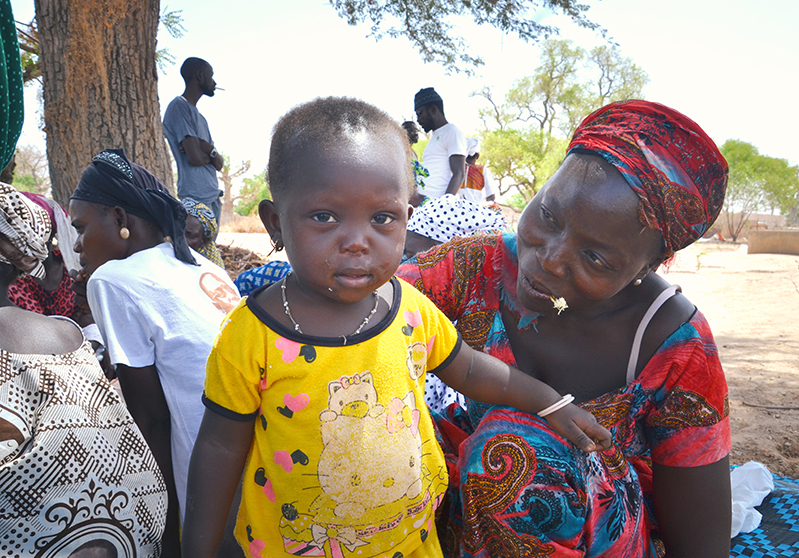
Citations
Root, Tik, and John Schwartz. “One Thing We Can Do: Drive Less.” The New York Times, The New York Times, 28 Aug. 2019, https://www.nytimes.com/2019/08/28/climate/one-thing-we-can-do-drive-less.html
USAID. “Climate Risk Profile: Senegal.” Climatelinks, 1 Jan. 2017, https://www.climatelinks.org/resources/climate-change-risk-profile-senegal
USGLC. “Climate Change and the Developing World: A Disproportionate Impact.” USGLC, Sept. 2019, https://www.usglc.org/blog/climate-change-and-the-developing-world-a-disproportionate-impact/
World Bank. “Country Senegal.” Climate Knowledge Portal, https://climateknowledgeportal.worldbank.org/country/senegal

